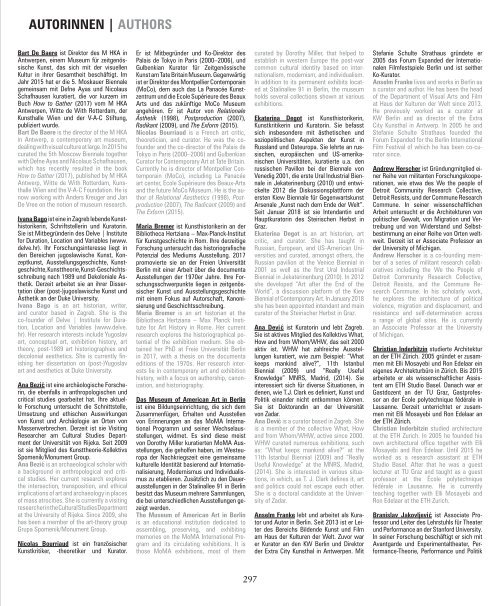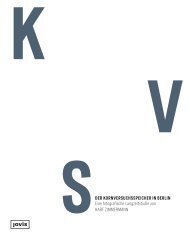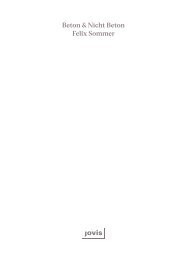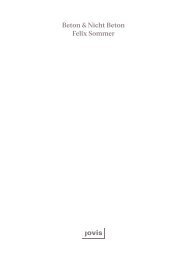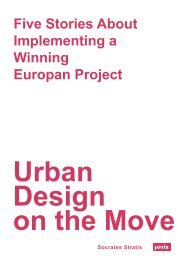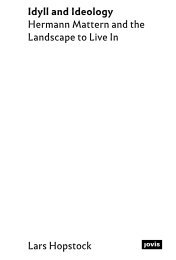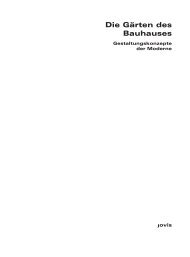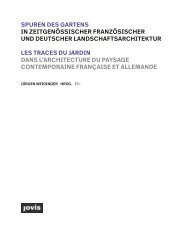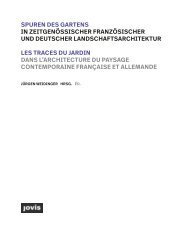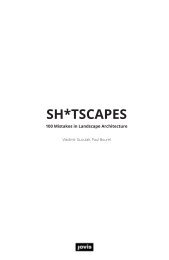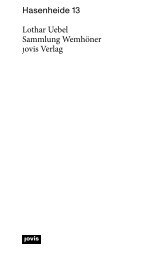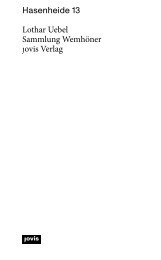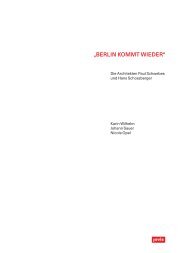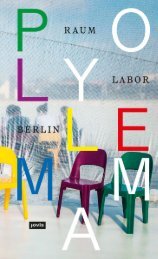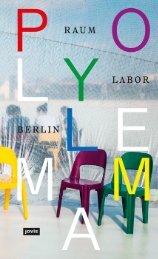Exhibiting Matters
ISBN 978-3-86859-854-4
ISBN 978-3-86859-854-4
Create successful ePaper yourself
Turn your PDF publications into a flip-book with our unique Google optimized e-Paper software.
AUTORINNEN | AUTHORS<br />
Bart De Baere ist Direktor des M HKA in<br />
Antwerpen, einem Museum für zeitgenössische<br />
Kunst, das sich mit der visuellen<br />
Kultur in ihrer Gesamtheit beschäftigt. Im<br />
Jahr 2015 hat er die 5. Moskauer Biennale<br />
gemeinsam mit Defne Ayas und Nicolaus<br />
Schafhausen kuratiert, die vor kurzem im<br />
Buch How to Gather (2017) vom M HKA<br />
Antwerpen, Witte de With Rotterdam, der<br />
Kunsthalle Wien und der V-A-C Stiftung,<br />
publiziert wurde.<br />
Bart De Baere is the director of the M HKA<br />
in Antwerp, a contemporary art museum,<br />
dealing with visual culture at large. In 2015 he<br />
curated the 5th Moscow Biennale together<br />
with Defne Ayas and Nicolaus Schafhausen,<br />
which has recently resulted in the book<br />
How to Gather (2017), published by M HKA<br />
Antwerp, Witte de With Rotterdam, Kunsthalle<br />
Wien and the V-A-C Foundation. He is<br />
now working with Anders Kreuger and Jan<br />
De Vree on the notion of museum research.<br />
Ivana Bago ist eine in Zagreb lebende Kunsthistorikerin,<br />
Schriftstellerin und Kuratorin.<br />
Sie ist Mitbegründerin des Delve | Institute<br />
for Duration, Location and Variables (www.<br />
delve.hr). Ihr Forschungsinteresse liegt in<br />
den Bereichen jugoslawische Kunst, Konzeptkunst,<br />
Ausstellungsgeschichte, Kunstgeschichte,<br />
Kunsttheorie, Kunst-Geschichtsschreibung<br />
nach 1989 und Dekoloniale Ästhetik.<br />
Derzeit arbeitet sie an ihrer Dissertation<br />
über (post-)jugoslawische Kunst und<br />
Ästhetik an der Duke University.<br />
Ivana Bago is an art historian, writer,<br />
and curator based in Zagreb. She is the<br />
co-founder of Delve | Institute for Duration,<br />
Location and Variables (www.delve.<br />
hr). Her research interests include Yugoslav<br />
art, conceptual art, exhibition history, art<br />
theory, post-1989 art historiographies and<br />
decolonial aesthetics. She is currently finishing<br />
her dissertation on (post-)Yugoslav<br />
art and aesthetics at Duke University.<br />
Ana Bezi ć ist eine archäologische Forscherin,<br />
die ebenfalls in anthropologischen und<br />
critical studies gearbeitet hat. Ihre aktuelle<br />
Forschung untersucht die Schnittstelle,<br />
Umsetzung und ethischen Auswirkungen<br />
von Kunst und Archäologie an Orten von<br />
Massenverbrechen. Derzeit ist sie Visiting<br />
Researcher am Cultural Studies Department<br />
der Universität von Rijeka. Seit 2009<br />
ist sie Mitglied des Kunsttheorie-Kollektivs<br />
Spomenik/Monument Group.<br />
Ana Bezi ć is an archaeological scholar with<br />
a background in anthropological and critical<br />
studies. Her current research explores<br />
the intersection, transposition, and ethical<br />
implications of art and archaeology in places<br />
of mass atrocities. She is currently a visiting<br />
researcher in the Cultural Studies Department<br />
at the University of Rijeka. Since 2009, she<br />
has been a member of the art-theory group<br />
Grupa Spomenik/Monument Group.<br />
Nicolas Bourriaud ist ein französischer<br />
Kunstkritiker, -theoretiker und Kurator.<br />
Er ist Mitbegründer und Ko-Direktor des<br />
Palais de Tokyo in Paris (2000–2006), und<br />
Gulbenkian Kurator für Zeitgenössische<br />
Kunst am Tate Britain Museum. Gegenwärtig<br />
ist er Direktor des Montpellier Contemporain<br />
(MoCo), dem auch das La Panacée Kunstzentrum<br />
und die Ecole Supérieure des Beaux<br />
Arts und das zukünftige MoCo Museum<br />
angehören. Er ist Autor von Relationale<br />
Ästhetik (1998), Postproduction (2007),<br />
Radikant (2009), und The Exform (2015).<br />
Nicolas Bourriaud is a French art critic,<br />
theoretician, and curator. He was the cofounder<br />
and the co-director of the Palais de<br />
Tokyo in Paris (2000–2006) and Gulbenkian<br />
Curator for Contemporary Art at Tate Britain.<br />
Currently he is director of Montpellier Contemporain<br />
(MoCo), including La Panacée<br />
art center, Ecole Supérieure des Beaux-Arts<br />
and the future MoCo Museum. He is the author<br />
of Relational Aesthetics (1998), Postproduction<br />
(2007), The Radicant (2009) and<br />
The Exform (2015).<br />
Maria Bremer ist Kunsthistorikerin an der<br />
Bibliotheca Hertziana – Max-Planck-Institut<br />
für Kunstgeschichte in Rom. Ihre derzeitige<br />
Forschung untersucht das historiografische<br />
Potenzial des Mediums Ausstellung. 2017<br />
promovierte sie an der Freien Universität<br />
Berlin mit einer Arbeit über die documenta<br />
Ausstellungen der 1970er Jahre. Ihre Forschungsschwerpunkte<br />
liegen in zeitgenössischer<br />
Kunst und Ausstellungsgeschichte<br />
mit einem Fokus auf Autorschaft, Kanonisierung<br />
und Geschichtsschreibung.<br />
Maria Bremer is an art historian at the<br />
Bibliotheca Hertziana – Max Planck Institute<br />
for Art History in Rome. Her current<br />
research explores the historiographical potential<br />
of the exhibition medium. She obtained<br />
her PhD at Freie Universität Berlin<br />
in 2017, with a thesis on the documenta<br />
editions of the 1970s. Her research interests<br />
lie in contemporary art and exhibition<br />
history, with a focus on authorship, canonization,<br />
and historiography.<br />
Das Museum of American Art in Berlin<br />
ist eine Bildungseinrichtung, die sich dem<br />
Zusammenfügen, Erhalten und Ausstellen<br />
von Erinnerungen an das MoMA International<br />
Programm und seiner Wechselausstellungen,<br />
widmet. Es sind diese meist<br />
von Dorothy Miller kuratierten MoMA Ausstellungen,<br />
die geholfen haben, im Westeuropa<br />
der Nachkriegszeit eine gemeinsame<br />
kulturelle Identität basierend auf Internationalisierung,<br />
Modernismus und Individualismus<br />
zu etablieren. Zusätzlich zu den Dauerausstellungen<br />
in der Stalinallee 91 in Berlin<br />
besitzt das Museum mehrere Sammlungen,<br />
die bei unterschiedlichen Ausstellungen gezeigt<br />
werden.<br />
The Museum of American Art in Berlin<br />
is an educational institution dedicated to<br />
assembling, preserving, and exhibiting<br />
memories on the MoMA International Program<br />
and its circulating exhibitions. It is<br />
those MoMA exhibitions, most of them<br />
curated by Dorothy Miller, that helped to<br />
establish in western Europe the post-war<br />
common cultural identity based on internationalism,<br />
modernism, and individualism.<br />
In addition to its permanent exhibits located<br />
at Stalinallee 91 in Berlin, the museum<br />
holds several collections shown at various<br />
exhibitions.<br />
Ekaterina Degot ist Kunsthistorikerin,<br />
Kunstkritikerin und Kuratorin. Sie befasst<br />
sich insbesondere mit ästhetischen und<br />
soziopolitischen Aspekten der Kunst in<br />
Russland und Osteuropa. Sie lehrte an russischen,<br />
europäischen und US-amerikanischen<br />
Universitäten, kuratierte u.a. den<br />
russischen Pavillon bei der Biennale von<br />
Venedig 2001, die erste Ural Industrial Biennale<br />
in Jekaterinenburg (2010) und entwickelte<br />
2012 die Diskussionsplattform der<br />
ersten Kiew Biennale für Gegenwartskunst<br />
Arsenale „Kunst nach dem Ende der Welt“.<br />
Seit Januar 2018 ist sie Intendantin und<br />
Hauptkuratorin des Steirischen Herbst in<br />
Graz.<br />
Ekaterina Degot is an art historian, art<br />
critic, and curator. She has taught in<br />
Russian, European, and US-American Universities<br />
and curated, amongst others, the<br />
Russian pavilion at the Venice Biennial in<br />
2001 as well as the first Ural Industrial<br />
Biennial in Jekaterinenburg (2010). In 2012<br />
she developed “Art after the End of the<br />
World”, a discussion platform of the Kiev<br />
Biennial of Contemporary Art. In January 2018<br />
she has been appointed intendant and main<br />
curator of the Steirischer Herbst in Graz.<br />
Ana Devi ć ist Kuratorin und lebt Zagreb.<br />
Sie ist aktives Mitglied des Kollektivs What,<br />
How and from Whom/WHW, das seit 2000<br />
aktiv ist. WHW hat zahlreiche Ausstellungen<br />
kuratiert, wie zum Beispiel: “What<br />
keeps mankind alive?”, 11th Istanbul<br />
Biennial (2009) und “Really Useful<br />
Knowledge” MNRS, Madrid, (2014). Sie<br />
interessiert sich für diverse Situationen, in<br />
denen, wie T.J. Clark es definiert, Kunst und<br />
Politik einander nicht entkommen können.<br />
Sie ist Doktorandin an der Universität<br />
von Zadar.<br />
Ana Devi ćis a curator based in Zagreb. She<br />
is a member of the collective What, How<br />
and from Whom/WHW, active since 2000.<br />
WHW curated numerous exhibitions, such<br />
as: “What keeps mankind alive?” at the<br />
11th Istanbul Biennial (2009) and “Really<br />
Useful Knowledge” at the MNRS, Madrid,<br />
(2014). She is interested in various situations,<br />
in which, as T. J. Clark defines it, art<br />
and politics could not escape each other.<br />
She is a doctoral candidate at the University<br />
of Zadar.<br />
Anselm Franke lebt und arbeitet als Kurator<br />
und Autor in Berlin. Seit 2013 ist er Leiter<br />
des Bereichs Bildende Kunst und Film<br />
am Haus der Kulturen der Welt. Zuvor war<br />
er Kurator an den KW Berlin und Direktor<br />
der Extra City Kunsthal in Antwerpen. Mit<br />
Stefanie Schulte Strathaus gründete er<br />
2005 das Forum Expanded der Internationalen<br />
Filmfestspiele Berlin und ist seither<br />
Ko-Kurator.<br />
Anselm Franke lives and works in Berlin as<br />
a curator and author. He has been the head<br />
of the Department of Visual Arts and Film<br />
at Haus der Kulturen der Welt since 2013.<br />
He previously worked as a curator at<br />
KW Berlin and as director of the Extra<br />
City Kunsthal in Antwerp. In 2005 he and<br />
Stefanie Schulte Strathaus founded the<br />
Forum Expanded for the Berlin International<br />
Film Festival of which he has been co-curator<br />
since.<br />
Andrew Herscher ist Gründungmitglied einer<br />
Reihe von militanten Forschungskooperationen,<br />
wie etwa des We the people of<br />
Detroit Community Research Collective,<br />
Detroit Resists, und der Commune Research<br />
Commune. In seiner wissenschaftlichen<br />
Arbeit untersucht er die Architekturen von<br />
politischer Gewalt, von Migration und Vertreibung<br />
und von Widerstand und Selbstbestimmung<br />
an einer Reihe von Orten weltweit.<br />
Derzeit ist er Associate Professor an<br />
der University of Michigan.<br />
Andrew Herscher is a co-founding member<br />
of a series of militant research collaboratives<br />
including the We the People of<br />
Detroit Community Research Collective,<br />
Detroit Resists, and the Commune Research<br />
Commune. In his scholarly work,<br />
he explores the architecture of political<br />
violence, migration and displacement, and<br />
resistance and self-determination across<br />
a range of global sites. He is currently<br />
an Associate Professor at the University<br />
of Michigan.<br />
Christian Inderbitzin studierte Architektur<br />
an der ETH Zürich. 2005 gründet er zusammen<br />
mit Elli Mosayebi und Ron Edelaar ein<br />
eigenes Architekturbüro in Zürich. Bis 2015<br />
arbeitete er als wissenschaftlicher Assistent<br />
am ETH Studio Basel. Danach war er<br />
Gastdozent an der TU Graz, Gastprofessor<br />
an der École polytechnique fédérale in<br />
Lausanne. Derzeit unterrichtet er zusammen<br />
mit Elli Mosayebi und Ron Edelaar an<br />
der ETH Zürich.<br />
Christian Inderbitzin studied architecture<br />
at the ETH Zurich. In 2005 he founded his<br />
own architectural office together with Elli<br />
Mosayebi and Ron Edelaar. Until 2015 he<br />
worked as a research assistant at ETH<br />
Studio Basel. After that he was a guest<br />
lecturer at TU Graz and taught as a guest<br />
professor at the École polytechnique<br />
fédérale in Lausanne. He is currently<br />
teaching together with Elli Mosayebi and<br />
Ron Edelaar at the ETH Zurich.<br />
Branislav Jakovljevi ć ist Associate Professor<br />
und Leiter des Lehrstuhls für Theater<br />
und Performance an der Stanford University.<br />
In seiner Forschung beschäftigt er sich mit<br />
Avantgarde und Experimentaltheater, Performance-Theorie,<br />
Performance und Politik<br />
297


